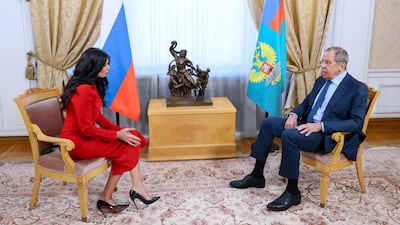Live updates: Follow the latest on Israel-Gaza
Russian Foreign Minister Sergey Lavrov said Israeli attacks on Hezbollah in Lebanon are aimed at provoking a large-scale escalation that would ultimately prompt US military intervention in the region.
“We oppose any escalation, but unfortunately there are those seeking to heat this escalation to its maximum limit, specifically to provoke a direct intervention in the region by the US army,” Mr Lavrov said in an interview with Sky News Arabia, broadcast on Saturday.
An Israeli strike on Beirut’s southern suburb of Dahieh killed at least 45 people, including a senior Hezbollah commander, on Friday, days after dozens were killed when communications devices used by the group exploded. Israel has been accused of orchestrating the blasts.
“I believe that Hezbollah is behaving with restraint, considering the capabilities it possesses,” Mr Lavrov said. “They want to provoke it with the same goal of making the US intervention in the war inevitable,” he added, without directly naming Israel.
Russia is a close ally of Iran, which backs Hamas and Hezbollah among several regional groups fighting against Israel.
Mr Lavrov said the assassination of Hamas leader Ismail Haniyeh in Tehran in July was also aimed at pushing Washington into the war. Israel has not claimed responsibility for Mr Haniyeh's death but has been accused of the killing by Iran.
“I cannot imagine anything more despicable and cynical than this,” Mr Lavrov said of Mr Haniyeh’s assassination. He “appreciates” that Iran did not “slide into a large-scale military response," he added.
“The bet was that Iran would do something that would force the United States to intervene with its armed forces,” Mr Lavrov said. However, he added, he believes the administration of US President Joe Biden is “aware of the danger” such an outcome would pose.
Israel and Hezbollah have been engaged in almost daily exchanges of fire since October 8, a day after the start of the war in Gaza. Hezbollah said it initiated the attacks in support of its ally Hamas, which launched raids into southern Israel on October 7, killing about 1,200 people and abducting about 240.
Almost a year later, with much of Gaza destroyed and more than 41,400 Palestinians killed, according to the enclave's Health Ministry, fears have been growing of a full-scale war in Lebanon as Israel turns its attention to its northern border.
To prevent escalation, Mr Lavrov said the main priority should be a “complete and permanent ceasefire” in Gaza and the creation of a Palestinian state, without which “outbreaks of violence in the Middle East will continue”.
Russia has repeatedly condemned Israel's conduct in Gaza. President Vladimir Putin has compared Israel's actions in the enclave to the Nazi siege of Leningrad during the Second World War. In May, he reaffirmed his support for an independent Palestinian state during a meeting with Palestinian Authority President Mahmoud Abbas in Moscow.
Hamas released three Israeli-Russian hostages as a “tribute” to Mr Putin for not condemning the group.
In addition to its support for Palestine, Russia has consistently also maintained its support for Israel.
Mr Lavrov stressed the importance of a two-state solution where Israel and Palestine would “coexist as good neighbours”. However, he said a solution would only be possible if it ensures Israel’s security, but that this should not be achieved “at the expense of the security of others”.
He described the October 7 Hamas attack as an “outrageous act” that all “sensible people condemn”.
“But responding to a crime with another crime, especially through the prohibited method of collective punishment of civilians is unacceptable,” he added.
“More than twice as many people were killed in 10 months than in 10 years of war in Donbas,” he said, referring to eastern Ukraine, which has been at the centre of conflict between Moscow and Kyiv since 2014.
Relations with Middle East
Mr Lavrov said Russia had “very good relations” with Arab countries “with no exceptions”, but particularly with the six Gulf states. Collaboration through Opec+ and the Gas Exporting Countries Forum has strengthened Moscow’s “strategic partnership” with the UAE, Saudi Arabia and Qatar, as well as other Gulf countries, he said.
He also praised the UAE, Saudi Arabia and Qatar for their contribution towards resolving issues related to the war in Ukraine.
The UAE has played a crucial role in brokering prisoner exchange deals between Moscow and Kyiv. Each side released 103 prisoners earlier this month in a deal mediated by the UAE, the eighth such exchange since Russia's full-scale invasion in February 2022.
The UAE's Ministry of Foreign Affairs said the agreement was a reflection of the co-operation and friendship between the UAE and the two countries.
Mr Lavrov also welcomed the normalisation of ties between Saudi Arabia and Iran, which he said would protect the interests of both countries and those in the region. Tehran and Riyadh restored diplomatic ties in a Chinese-brokered agreement in March last year after a gap of seven years.
Speaking on Russia's relations with Iran, Mr Lavrov said they existed “within the framework of full commitment to international law”. Iran has been accused of providing support to Russia to wage its war in Ukraine, particularly by providing Moscow with drones, missiles and spare parts for weapons.

